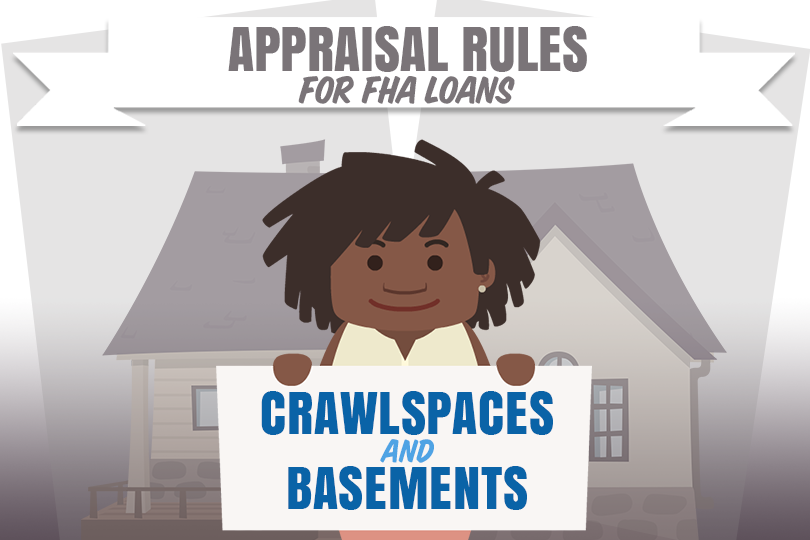FHA Appraisal Rules for Basements
May 7, 2022
You may not be on the hook for those corrections, but if you are trying to negotiate with a seller in a competitive market and you really want that house, negotiating who pays for the appraisal correction might be something to consider.
With that in mind, what are the FHA appraisal rules for a home that comes with a basement or crawlspace? The FHA appraisal process includes specific standards in this area which must be met. In cases where there are corrections required as a condition of loan approval, those corrections must be made and inspected--it’s not done on an honor system.
The basic rules in this area begin with the general condition of the foundation--it must be adequate to properly support the home.
HUD 4000.1 contains rules for the lender and appraiser. It states, “The Mortgagee must confirm that all foundations will be serviceable for the life of the Mortgage and adequate to withstand all normal loads imposed.” And what happens if this is not true?
The FHA list of “defective conditions” for basements, crawlspaces, and the foundation includes:
“…evidence of possible structural failure (e.g., settlement or bulging foundation wall, unsupported floor joists, cracked masonry walls or foundation)”
Such conditions would be noted by the appraiser--corrections are recommended where feasible but such corrections are not always possible. If the problems cannot be corrected, the home cannot qualify for an FHA mortgage.
The foundation and the basement should be “serviceable” over the entire duration of the loan term or must be repaired or modified to make that possible.
According to HUD 4000.1, “The Appraiser must perform a visual observation of the foundation and Structure of the improvements and report those results.” In cases where the FHA appraiser detects a structural issue, HUD 4000.1 says the Appraiser must “address the nature of the deficiency in the appraisal where physical deficiencies or adverse conditions” are reported and which may demand an inspection.
Basement issues may include things not directly related to the structural soundness of the foundation. For example, sump pump systems must be suitable to properly service the home and must be in good repair. If the appraiser notes the sump pump system does not meet these basic requirements, corrections are likely to be required in the appraisal report.
Any evidence of excessive moisture in a basement or crawlspace is an area of concern for the appraisal. If you note standing water, trickling water, or very damp basement walls when you do your initial walkthrough of any property, you can expect the appraiser to note the same problems.
------------------------------
RELATED VIDEOS:
Here's the Scoop on Conventional Loans
When Do You Need a Cosigner?
Analyzing Your Debt Ratio

FHA Loan Articles
September 8, 2023Borrowers considering an FHA loan should be familiar with some basic loan terminology. These loans are popular among first-time homebuyers and those with lower credit scores because they often offer more flexible eligibility requirements and lower down payment options.
September 2, 2023You may have heard the terms co-borrower and cosigner in connection with your FHA loan process, but aren't sure about the distinction. Both a co-borrower and a cosigner can help a primary borrower qualify for a mortgage, but they have different roles and responsibilities.
August 27, 2023The Federal Housing Administration has specific credit requirements and guidelines for borrowers looking to buy or refinance homes with an FHA loan. In addition to what FHA guidelines state, lenders may have more stringent requirements that may vary from one lender to another.
August 23, 2023Mortgage APR (Annual Percentage Rate) and a loan's interest rate are two different things, although they are closely related. Understanding the difference is an important part of a borrower's analysis of the true cost of their mortgage.
August 19, 2023FHA refinance loans allow homeowners with existing FHA loans to refinance their mortgages. These loans are designed to help borrowers take advantage of lower interest rates, reduce their monthly mortgage payments, or access equity in their homes for various purposes.







